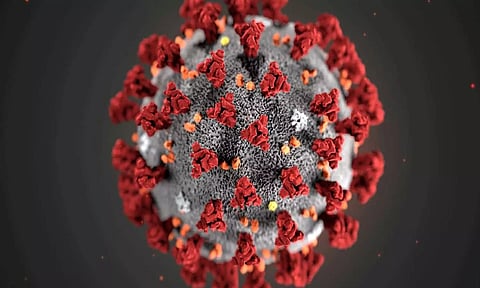

NEW DELHI: As scientists look at the emergence of BA.2.86 Covid variant as a reminiscence of Omicron virus, they are in a huddle to find out if the new highly-mutated coronavirus variant will be a global concern or not.
The new variant has been linked to six cases in four countries -- Israel, Denmark, the UK and the US, and the World Health Organisation (WHO) has designated BA.2.86 as a variant under monitoring.
The lineage seems to be descended from an Omicron sub-variant called BA.2, which caused large case spikes in early 2022.
In India, amid the detection of certain new variants of SARS-CoV-2 virus, senior officials of the Prime Minister's Office (PMO) earlier this week held a review meeting to take stock of the situation.
According to a Nature report, although the lineage seems to be exceedingly rare, "it is very different from other circulating variants and carries numerous changes to its spike protein, a key focus of the body's immune attack on the SARS-CoV-2 virus".
"Almost certainly there are going to be other cases that will start popping up," said Adam Lauring, a virologist and infectious-disease physician at the University of Michigan in the US, whose lab identified one person infected with BA.2.86.
"There's good reason to think it won't be like the Omicron wave, but it's early days," Lauring added.
Large numbers of spike mutations have been observed in people with long-term SARS-CoV-2 infections, and it is likely that BA.2.86 also emerged from one such chronic infection, according to Jesse Bloom, a viral evolutionary biologist at the Fred Hutchinson Cancer Center in Seattle, Washington.
Many of BA.2.86's changes are in regions of the spike protein targeted by the body's potent infection-blocking, or neutralising antibodies.
"For this reason, there is a good chance that the variant will be able to escape some of the neutralising antibodies triggered by previous infections and vaccine boosters," the Nature report noted.
Another feature of BA.2.86 is its geographical distribution. None of the cases seem to be linked, which suggests that variant may already be fairly widespread.
After Omicron appeared, SARS-CoV-2 evolution began to follow a somewhat predictable course: successful new variants emerged from circulating lineages after gaining a few key mutations that enabled their spread.
BA.2.86, by contrast, is drastically different from other widespread coronavirus variants, reminiscent of Omicron and early pandemic variants including Alpha and Delta.
"Just like Omicron was a little out of left field, this BA.2.86 is little out of left field," said Ashish Jha, a public-health researcher at Brown University in Providence, Rhode Island.
"There is enough here to get us all to start paying attention," said Jha, also the former White House Covid-19 Response Coordinator.
The WHO has designated Covid-19 variant BA.2.86 as a 'variant under monitoring' due to the large number of mutations it carries, adding that "the number of mutations warrants attention".